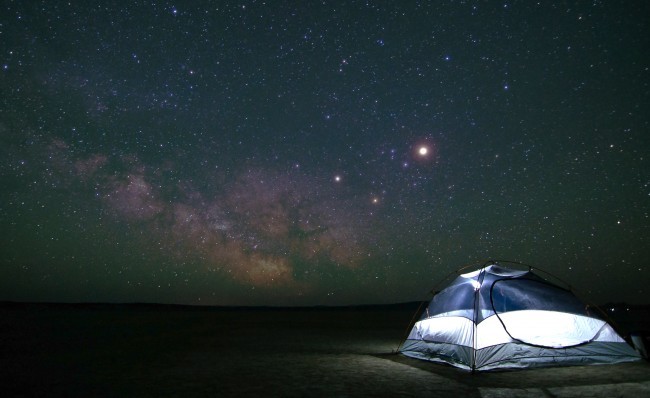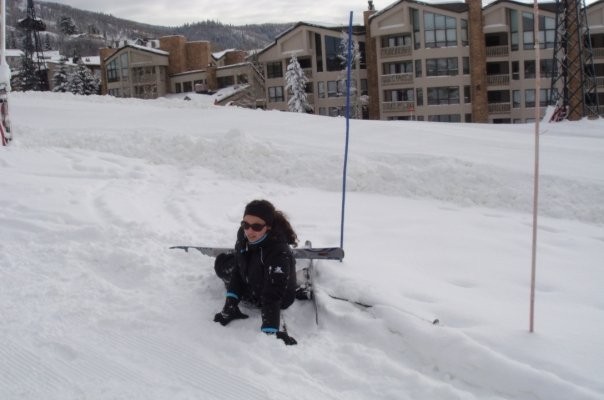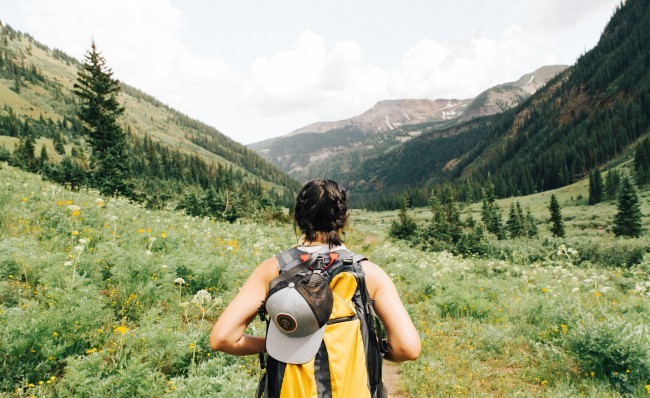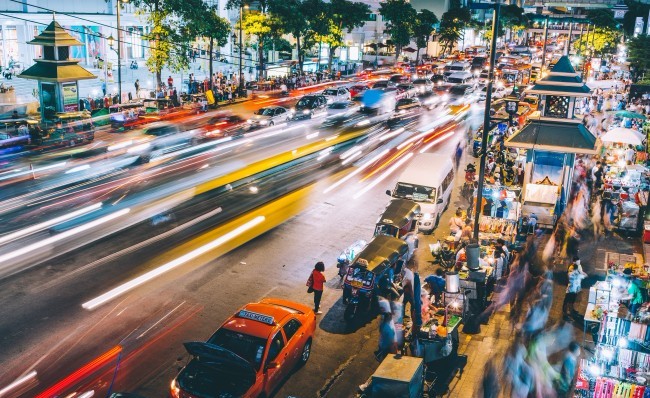
“We’re going to get you down this mountain, I promise,” Chris said grasping my hands tightly. “I am going to get you down.”
I thought of Rugby teams forced into cannibalism in the Andes and tales of extreme survival on Oprah that inevitably ended with toes being lopped off due to frostbite. I thought of being trapped in a canyon, 127 Hours style, and having to saw off a limb to survive. I decided that I could spare my left arm, in a pinch.
“I’m scared,” I said tears streaming down my face, freezing in little droplets to my eyelashes.
“Don’t be. You’re going to be okay,” my beginning ski instructor assured me.
I’d made the horrible mistake of venturing to the top of a mountain for “an adventure.” Now, I was going to die. Snuffed out at only 22. And with so much life left to live! I’d never even tried taking mushrooms in the desert!
To my left, a four year old girl zoomed around me on her skis.
“’Scuse me,” the very small child, who’d only recently learned to speak in complete sentences, chirped as she disappeared through the trees. I shivered in the spray of her snowy wake. I was on the very easiest trail at Steamboat Springs and I was definitely doomed.

The point of this preamble is to say: I love nature, I do. But I’m not particularly “good” at it. I’m clumsy and I hate being cold and my arm strength is what an elementary teacher during a physical fitness assessment might call “really f*cking bad.” When I went on a week-long backpacking camping trip at 18, my friends and family said, “You?” in the same voice Michael Bluth would say, “Her?” every time George Michael brought up his relationship with Egg on Arrested Development.
So I certainly was not a good candidate to try skiing my senior year in college. And yet, I got in a car with three other friends, and drove all night from Chicago to be in Colorado by morning for a weekend escape. And it was amazing. Even if a virtual stranger had to ski backwards while holding my hands so that I didn’t die on a beginner’s trail, I’m glad I did it. Leaving your comfort zone to spend time in the outdoors is, in my experience, always worth it.
Being in the city all the time just isn’t good for you. It’s why over the past few weeks we’ve been talking about microadventures. Taking a break from city life, even for 24 hours, is genuinely restorative. Even if you’re bad at skiing (or surfing or hiking), even if you can only get away for a day or a couple of hours, go anyway. There’s an intrinsic benefit to giving it a shot.
My mid-mountain panic aside, nature affects your mental and physical health positively and there’s a ton of scientific research to back that up. Being around trees, lakes, and mountains is more critical (and should be more of a priority) than many of us realize. Here’s why:
Nature does really good things for your mental health.

When I’m struggling with depression, my instinct is to curl up and stay inside. The last thing I want to do is force myself to drive an hour to the mountains. So I end up binge-watching a show I’ve seen a million times, and slipping further and further into a sadness spiral. But when I do that, I’m doing a serious myself a disservice. Because getting out in nature (for even a quick adventure) has been shown to reduce depression. And you don’t have to do that much.
A study published in Proceedings of the National Academy of Science found that walking in the woods for as little as 90 minutes showed decreased activity in an area of the brain heavily associated with depression. The same decrease was not seen in the participants who walked through urban settings for the same amount of time. It wasn’t the exercise (or at least just the exercise) that improved their symptoms. Being in natural surroundings rather than walking by buildings and traffic made a marked difference.
In the same study, researchers found that repetitive thought focused on negative emotions also decreased when in nature versus a city landscape. Basically, that feeling of peace and tranquility that we get when we walk into the woods or stand in front of the ocean is real. Our neural activity changes when we go into the wild.
“These results suggest that accessible natural areas may be vital for mental health in our rapidly urbanizing world,” said co-author and Stanford professor Gretchen Daily.
Depression is a complicated disease and we encourage you to seek professional help for serious depression. But it’s becoming clear that nature does help us to regulate our emotions. So the next time you start to feel a low, emotional spell coming on, a quick camping trip or even just a walk through a nature preserve might be part of the remedy.
Getting away from technology and into nature can help with memory recall.

“Who has a higher net worth do you think? Kanye or Kim?” My sister-in-law asked as I drove my family to the airport this morning. Before I even had time to answer, my brother had already looked it up.
“It’s Kim,” he said, “I googled it.”
Remember when people had to just wonder things? We live in a world now where every bit of information is constantly at our fingertips, where all of our friends and family and random acquaintances can be reached at any moment in countless ways using a computer that can fit in our pockets. When you think about it, it’s mind-blowing the new tools we have.
But maybe our toys ought not be “all the time” tools. In a study at California State University, Dominguez Hills, psychologist Larry Rosen used an app to find out how many times college students unlock their phones on average. He found that the typical student checked their phone 60 times a day for a total of 220 minutes of phone time. To me, that seems low. I look at my phone like an addict. I genuinely feel twitchy if I don’t know where it is, if I can’t see if anyone has texted or emailed me. It’s exhausting. And Rosen points out that these constant short sessions make for a lot of daily interruption to our activities. That can effect our interactions and connection with real-live people, our ability to complete tasks, and our memory.
A Harvard study looked at whether our memory is affected by our increasing dependence on and access to technology. The study — Google Effects on Memory: Cognitive Consequences of Having Information at Our Fingertips — showed that if people have access to a search engine then they retain less information and are able to memorize less facts. To test this, researchers asked participants to type and remember a series of statements. For half of the subjects, they told them that the facts were being saved in the computer. For the others, that it was being immediately erased. Those who believed their statements had been erased were able to better remember them than those that thought they’d be able to look at them again later.
Look, barring some sort of apocalyptic event where we all end up drag racing through a desert Hellscape Mad Max style, technology is here to stay, and exactly how that influx of technology is going to negatively or positively affect our brains in the long run is unknown. Technology and access to information can be incredibly positive. But also, taking a break from that technology is important, and can help our brains.
When I go somewhere with no cell service, at first, I feel a sense of panic, but then freedom. Driving out for a hike or camping in a National Park (even for just a night) helps you unwind and reconnect to the places in yourself that you were (perhaps) using tech to distract yourself from. It can help you remember more and sleep better and recharge that human part of yourself (while — don’t panic — your ipad safely charges at home).
The stress of being constantly “busy” is killing us. Spending time out of the city reduces that.

When I get stressed out, I start getting shooting pains down my arms and numbness in my hands. It’s terrifying. And I’m not alone in stress actually hurting my body. It manifests itself physically for many of us. According to Mayo clinic, stress can cause headaches, chest pain, sleep issues, stomach upset, and muscle pain. And unfortunately, according to the American Psychological Association, Americans are the most stressed they’ve been in a decade. Blame it on the political climate, or the school debt most of us are in, or the insanely high housing costs with less job opportunities, but we’re facing an incredible amount of chronic stress these days, and it’s detrimental to our health.
The good news though is that getting into nature can actually lower stress levels. According to a series of experiments conducted in Japan, there are positive physiological effects to being in the forest. Researchers had subjects in 24 different forests walk in both the forest and a city area. After each excursion, they checked salivary cortisol, blood pressure, pulse rate, and heart rate variability. When walking in the forest as opposed to the city, subjects has lower cortisol, pulse rate, and blood pressure all related to lowering overall stress.
So grabbing a bike and hitting the trail could reduce your stress and help you live longer. Plus, it’s also more fun than sitting at a computer, looking at million dollar bungalows on Zillow, and realizing you’ll never own anything that’s not a cat.
Nobody wants to see your selfie in front of the bathroom mirror. Literally. A break from social media will land you more friends.
https://www.instagram.com/p/BYwIAtzheXy/
In 2015, more people died from selfies than shark attacks, let that sink in. But it’s more than that. Our selfie obsessed culture has led to a decrease in intimacy in our relationships. A joint study conducted by the University of Birmingham, the University of Edinburgh, and Heriot-Watt University found that people who post too many selfies of themselves tended to have less close personal relationships and there was a decrease in how much other “friends” and followers liked them. In other words, no matter how ripped your abs are, your selfie habit is going to make you die alone.
So maybe go into the desert and take pictures of the sunset once in a while or actually (gasp) don’t take any pictures at all. Live in the moment. You’ll probably remember it better, have improved health, and actually bond with the people around you.
Because when even Netflix is embarrassed by how many times you’ve watched The Christmas Prince, you know it’s time to go outside.






